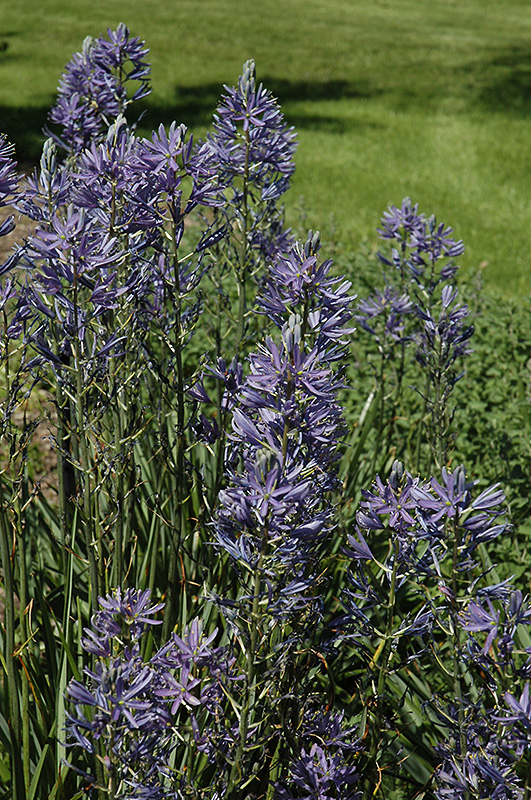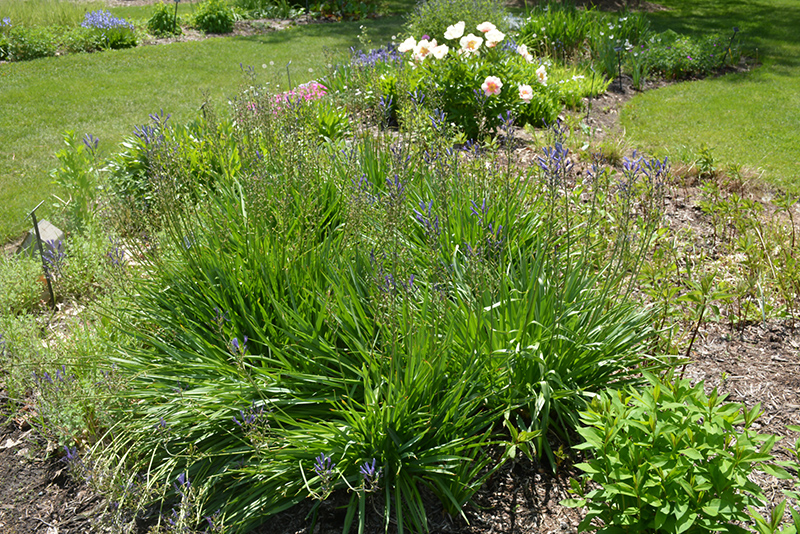Plant Height: 24 inches
Flower Height: 4 feet
Spread: 18 inches
Sunlight:
![]()
![]()
Hardiness Zone: 5a
Other Names: Quamash, Wild or American Hyacinth, C. Caerulea
Description:
Elegant and bold blue star-flowers steal the show in springtime; underplant with lower growers as leaves will die back; good plant for wet edges of ponds and bogs; plant bulbs in fall; a strong plant that seldom needs support
Ornamental Features
Blue Danube Camassia features showy spikes of sky blue star-shaped flowers with yellow eyes at the ends of the stems from mid spring to early summer. The flowers are excellent for cutting. Its grassy leaves remain green in colour throughout the season.
Landscape Attributes
Blue Danube Camassia is an open herbaceous perennial with tall flower stalks held atop a low mound of foliage. Its relatively fine texture sets it apart from other garden plants with less refined foliage.
This plant will require occasional maintenance and upkeep, and is best cleaned up in early spring before it resumes active growth for the season. Deer don't particularly care for this plant and will usually leave it alone in favor of tastier treats. It has no significant negative characteristics.
Blue Danube Camassia is recommended for the following landscape applications;
- Mass Planting
- General Garden Use
- Naturalizing And Woodland Gardens
- Container Planting
Planting & Growing
Blue Danube Camassia will grow to be about 24 inches tall at maturity extending to 4 feet tall with the flowers, with a spread of 18 inches. It grows at a medium rate, and under ideal conditions can be expected to live for approximately 6 years. As an herbaceous perennial, this plant will usually die back to the crown each winter, and will regrow from the base each spring. Be careful not to disturb the crown in late winter when it may not be readily seen! As this plant tends to go dormant in summer, it is best interplanted with late-season bloomers to hide the dying foliage.
This plant does best in full sun to partial shade. It is quite adaptable, prefering to grow in average to wet conditions, and will even tolerate some standing water. It is particular about its soil conditions, with a strong preference for clay, alkaline soils, and is able to handle environmental salt. It is somewhat tolerant of urban pollution. This is a selection of a native North American species. It can be propagated by multiplication of the underground bulbs; however, as a cultivated variety, be aware that it may be subject to certain restrictions or prohibitions on propagation.
Blue Danube Camassia is a fine choice for the garden, but it is also a good selection for planting in outdoor pots and containers. With its upright habit of growth, it is best suited for use as a 'thriller' in the 'spiller-thriller-filler' container combination; plant it near the center of the pot, surrounded by smaller plants and those that spill over the edges. It is even sizeable enough that it can be grown alone in a suitable container. Note that when growing plants in outdoor containers and baskets, they may require more frequent waterings than they would in the yard or garden.
Disclaimer - This resource is provided for informational purposes only and does NOT reflect current availability. Inventory varies seasonally, so we cannot guarantee that every plant will be in stock at all times - please contact your favourite GardenWorks location directly for current availability. It does not include our entire inventory of plants, so be sure to visit GardenWorks to see varieties that may not be represented on this list.


